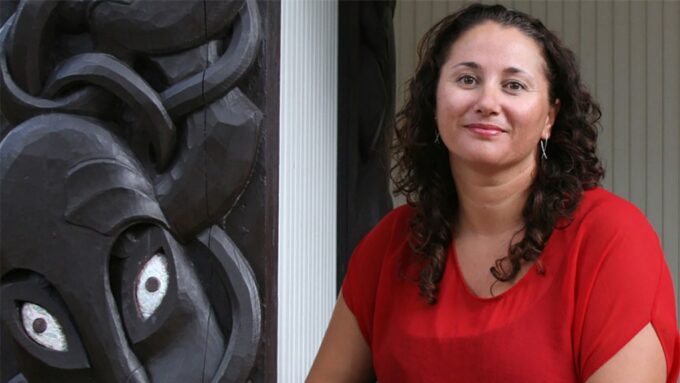
Professor Melinda Webber
<h2>Optimal conditions for Māori and Pasifika student success have been identified by a new project at the University of Auckland.</h2>
<div class="text section">
<p>The four-part study involved 4671 Māori and 1192 Pasifika students, 362 Pasifika whānau and 311 kaiako Māori (Māori educators) from 102 schools across Aotearoa.</p>
<p>It was led by Melinda Webber, a professor at Te Puna Wananga, Faculty of Education and Social Work and Dr Mohamed Alansari, a senior researcher at the New Zealand Council for Educational Research.</p>
<p>Taken together, says Professor Webber, the four studies identified critical factors that serve as important punga (anchors) in students’ learning experiences and are the key to successful outcomes.</p>
<p>“We found factors like ākonga (students) having strong and positive motivational beliefs about learning, participating in learning experiences that are culturally embracing, aspirational, and future-oriented, and having strong and positive networks of support and role models, both in and out of school, to be very important.”</p>
<p>She says home-school partnerships built on mutual care, respect, and a collective vision for ākonga and their communities was key; as were school conditions and teaching practices that are strength-based, ambitious, and contextually unique to the needs of Māori and Pasifika students.</p>
</div>
<div class="pullquotecomponent section">
<div class="pull-quote">
<blockquote>
<p>From a Māori worldview, role models are like &#8216;poutokomanawa&#8217;, they are people who hold the whare up, connect people to their cultures and futures, and at the same time embody the traits of people ākonga aspire to be.</p>
</blockquote>
<p class="quote-author"><span class="quote-author__name">Professor Melinda Webber </span><span class="quote-author__title">Te Puna Wananga, Faculty of Education and Social Work</span></p>
</div>
</div>
<div class="text section">
<p>And the good news is when students’ school lives were categorised as being either ‘flourishing, thriving, striving, surviving or struggling’ in the first study, Māori and Pasifika learners predominantly fell into the ‘flourishing, thriving or striving’ groups.</p>
<p>“They were motivated to learn, engaged in classroom activities and discussions, felt supported, and were proud of their cultural identity and connections,” says Professor Webber.</p>
<p>The second study identified the function and features of role models who support ākonga Māori.</p>
<p>“From a Māori worldview, role models are like &#8216;poutokomanawa&#8217;, they are people who hold the whare up, connect people to their cultures and futures, and at the same time embody the traits of people ākonga aspire to be,” she says.</p>
<p>The third looked at qualities and practices that Pasifika learners and families perceive as important to supporting Pasifika success. This study utilised a distinctly Fijian framework.</p>
<blockquote>
<p>“We found that central to the establishment of partnerships and relationships with Pasifika communities is an unwavering focus on sharing information about the child’s learning, and better understanding the collective way of living and observing culture that many Pasifika families practise,” says Professor Webber.</p>
</blockquote>
<p>The final study featured insights from kaiako Māori on schooling conditions that make a positive difference to MaÌori learners.</p>
<p>“Embedding te ao Māori in the school context enables Māori students to be, belong, and thrive at school. This has the potential to transform relationships, teaching practice, and learning experiences in ways that make a significant difference for ākonga Māori,” she says.</p>
<p>This COMPASS project is a collaboration between Rangahau Mātauranga o Aotearoa | New Zealand Council for Educational Research (NZCER) and Professor Melinda Webber from the University of Auckland.</p>
<p>It is part of NZCER’s Te Pae Tawhiti Government Grant programme, funded through the Ministry of Education.</p>
<p><a href="https://www.nzcer.org.nz/research/publications/conceptualising-m-ori-and-pasifika-aspirations-and-striving-success-compass" target="_blank">Conceptualising Māori and Pasifika Aspirations and Striving for Success</a> is by Melinda<br />
Webber, Mohamed Alansari, Sinead Overbye, Renee Tuifagalele, and Kiri Edge.</p>
</div>

Industrial, legal action and unrest between the education sector and the Ministry of Education rises…
Tumuaki Billie-Jean Potaka Ayton shares her perspectives on leadership, and building a community around your…
As well as physical access to spaces, a culture of inclusivity means valuing and respecting…
School design changes with the education ideology changes of the eras, explain New Zealand and…
In this op-ed, Rebecca Thomas encourages educators to pause and rediscover their fire and passion…
Curriculum rewrites at the Ministry of Education are struggling with a lack of clarity, according…
This website uses cookies.